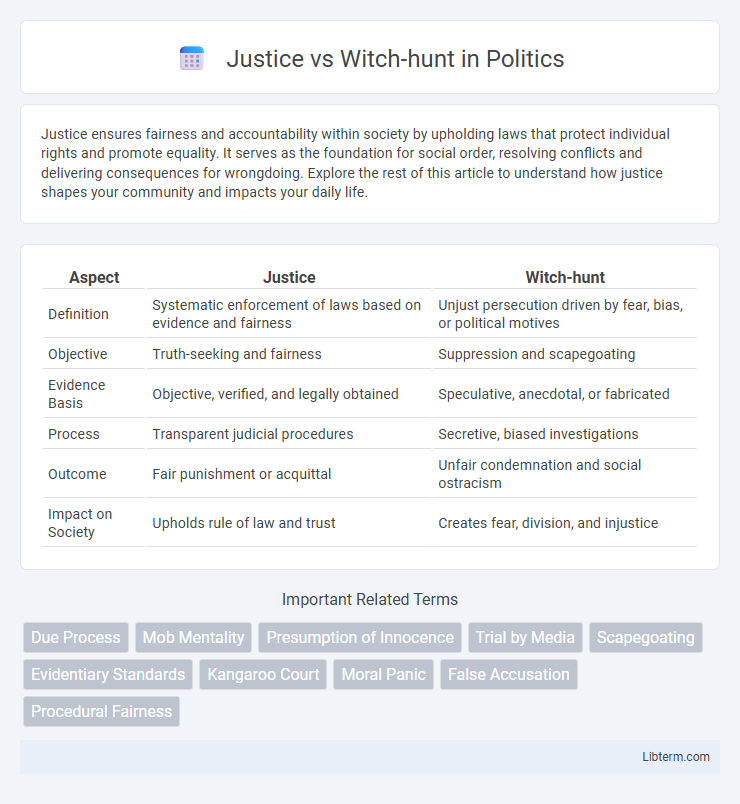Justice ensures fairness and accountability within society by upholding laws that protect individual rights and promote equality. It serves as the foundation for social order, resolving conflicts and delivering consequences for wrongdoing. Explore the rest of this article to understand how justice shapes your community and impacts your daily life.
Table of Comparison
| Aspect | Justice | Witch-hunt |
|---|---|---|
| Definition | Systematic enforcement of laws based on evidence and fairness | Unjust persecution driven by fear, bias, or political motives |
| Objective | Truth-seeking and fairness | Suppression and scapegoating |
| Evidence Basis | Objective, verified, and legally obtained | Speculative, anecdotal, or fabricated |
| Process | Transparent judicial procedures | Secretive, biased investigations |
| Outcome | Fair punishment or acquittal | Unfair condemnation and social ostracism |
| Impact on Society | Upholds rule of law and trust | Creates fear, division, and injustice |
Defining Justice and Witch-hunt
Justice embodies the principle of fairness, impartiality, and adherence to established laws designed to protect rights and maintain social order. A witch-hunt involves irrational persecution, targeting individuals based on fear, suspicion, or false accusations rather than evidence or due process. While justice seeks truth and accountability, a witch-hunt fosters injustice through bias, hysteria, and the violation of fundamental legal protections.
Historical Contexts of Witch-hunts
Witch-hunts, rooted in early modern Europe between the 15th and 18th centuries, reflect a period when fear, superstition, and religious dogma often overshadowed judicial fairness, leading to unjust persecutions and executions based on accusations of witchcraft. These events occurred within societies grappling with political instability, social upheaval, and shifting power dynamics, where scapegoating and mass hysteria undermined the principles of justice. The legal frameworks of the time lacked due process safeguards, resulting in trials that prioritized confession and conformity over evidence and rational adjudication.
Justice Systems: Principles and Practices
Justice systems embody principles such as fairness, impartiality, and the presumption of innocence, ensuring due process and equal protection under the law. These systems rely on evidence-based investigations and transparent trials to distinguish between legitimate legal actions and witch-hunts, which are driven by bias, fear, or misinformation. Upholding these principles prevents the erosion of public trust and protects individuals from arbitrary accusations and unjust persecution.
Markers of a True Justice Process
Markers of a true justice process include impartiality, evidence-based decision-making, and respect for due process rights. It requires transparency, the presumption of innocence, and safeguarding against bias or external influence. Genuine justice aims to uphold legal norms and human rights rather than targeting individuals based on fear or prejudice as seen in witch-hunts.
Warning Signs of a Witch-hunt
Warning signs of a witch-hunt include the rapid spread of accusations without evidence and the targeting of specific individuals or groups based on fear or prejudice. The erosion of due process, where accusations replace factual investigation, often leads to unjust punishment and social division. Heightened emotional responses and collective hysteria amplify these dynamics, undermining the principles of justice and fairness.
Media Influence: Justice or Hysteria?
Media influence shapes public perception of justice, often magnifying facts or fueling hysteria through sensationalized coverage. High-profile cases broadcasted extensively can lead to trial by media, distorting legal processes and pressuring authorities. Balanced reporting ensures accountability and informed discourse, while biased media risks escalating witch-hunts and undermining fair justice.
Social Consequences of Witch-hunt Accusations
Witch-hunt accusations often lead to severe social consequences, including widespread fear, mistrust, and the breakdown of community cohesion. Innocent individuals face social ostracism, loss of reputation, and sometimes violent repercussions based on unsubstantiated claims. These accusations undermine the principles of justice by prioritizing hysteria over fair evidence evaluation, resulting in long-lasting damage to social fabric and individual lives.
Legal Safeguards Against Witch-hunts
Legal safeguards against witch-hunts include clear evidentiary standards, the right to legal representation, and protection against self-incrimination, ensuring accused individuals receive fair trials. Independent judicial oversight and due process mechanisms prevent baseless accusations fueled by superstition or social bias. These safeguards uphold the rule of law and protect human rights by deterring arbitrary persecution rooted in fear or prejudice.
Case Studies: Justice Upheld vs. Witch-hunt
Case studies reveal stark contrasts between justice upheld and witch-hunt scenarios, highlighting due process and evidence-based verdicts in the former versus fear-driven accusations in the latter. The Salem witch trials exemplify a witch-hunt marked by mass hysteria and lack of fair trials, resulting in wrongful executions. In contrast, landmark cases like the Nuremberg Trials underscore justice upheld through systematic investigation, transparency, and adherence to legal standards.
Building a Culture of Fairness and Due Process
Building a culture of fairness and due process requires transparent investigation protocols and impartial decision-making frameworks that protect individual rights while addressing misconduct effectively. Emphasizing evidence-based assessments and safeguarding against bias minimizes the risk of witch-hunt dynamics that undermine justice systems. Institutions must implement consistent mechanisms for accountability to maintain trust and uphold the principles of justice.
Justice Infographic

 libterm.com
libterm.com